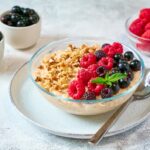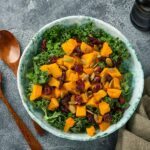A lacto-vegetarian diet is a plant-based eating pattern that includes dairy products but excludes meat, poultry, fish, and eggs. It is a popular choice for individuals seeking a nutritious and environmentally sustainable lifestyle. However, like any dietary approach, it is crucial to ensure that lacto-vegetarians consume a wide variety of foods and maintain adequate nutrient density to meet their nutritional needs. Variety and nutrient density play pivotal roles in promoting optimal health and well-being. Let’s delve into the significance of these factors in a lacto-vegetarian diet.
Variety is the spice of life, and it holds true for lacto-vegetarianism as well. Consuming a diverse range of plant-based foods ensures the intake of different nutrients, vitamins, minerals, antioxidants, and phytochemicals necessary for overall health. Each plant-based food has its unique nutritional profile, and incorporating a variety of fruits, vegetables, whole grains, legumes, nuts, and seeds ensures a well-rounded and balanced diet. This diversity not only prevents nutrient deficiencies but also promotes the synergistic effects of different nutrients, enhancing their absorption and utilisation in the body.
Including an array of colourful fruits and vegetables in a lacto-vegetarian diet provides an abundance of vitamins and minerals. Dark leafy greens like kale, spinach, and broccoli are excellent sources of calcium, iron, and vitamin K. Vibrant fruits such as berries, citrus fruits, and papaya offer an array of vitamins, fibre, and antioxidants. Additionally, whole grains like quinoa, brown rice, and oats provide complex carbohydrates, dietary fibre, and various essential nutrients. The inclusion of legumes, such as lentils, chickpeas, and black beans, offers a significant protein and fibre content along with essential minerals like zinc and magnesium.
While dairy products are a staple in a lacto-vegetarian diet, it is essential to opt for low-fat or non-fat varieties to minimize saturated fat and cholesterol intake. Additionally, lacto-vegetarians should consider incorporating alternative calcium sources like fortified plant-based milks, tofu, tempeh, and leafy greens into their meals. This ensures sufficient calcium intake for maintaining strong bones and teeth.
Nutrient density refers to the concentration of essential nutrients in a given food or diet. Lacto-vegetarians must pay close attention to nutrient density to ensure they meet their nutritional requirements without relying solely on dairy products. By choosing whole, minimally processed foods, lacto-vegetarians can maximise nutrient density and optimise their health. Whole grains, legumes, fruits, vegetables, nuts, and seeds should form the foundation of a lacto-vegetarian diet, providing essential macronutrients, vitamins, minerals, and dietary fiber.
Protein is a vital component of any diet, and lacto-vegetarians can obtain sufficient protein by combining different plant-based protein sources. Legumes, such as beans, lentils, and peas, are excellent sources of protein. Additionally, whole grains, nuts, and seeds also contribute to the protein intake. By incorporating a variety of these foods throughout the day, lacto-vegetarians can ensure they receive all the essential amino acids necessary for proper growth, repair, and maintenance of the body.
Omega-3 fatty acids, primarily found in fatty fish, are crucial for heart health and brain function. Lacto-vegetarians can obtain these essential fatty acids from plant-based sources such as chia seeds, flaxseeds, hemp seeds, walnuts, and algae-based supplements. Including these foods in the diet ensures an adequate intake of omega-3 fatty acids.
Vitamin B12, which is primarily found in animal products, can be a concern for lacto-vegetarians. However, it can be obtained through fortified plant-based milk, breakfast cereals, nutritional yeast, and supplements. Regular monitoring of vitamin B12 levels and consulting with a healthcare professional can help lacto-vegetarians ensure they meet their requirements.
Variety and nutrient density are fundamental aspects of a healthy lacto-vegetarian diet. By incorporating a wide range of plant-based foods, lacto-vegetarians can obtain a diverse array of nutrients, vitamins, minerals, and antioxidants necessary for optimal health. Emphasising nutrient-dense foods and paying attention to key nutrients like protein, calcium, omega-3 fatty acids, and vitamin B12 are crucial for meeting the dietary needs of lacto-vegetarians. With proper planning and knowledge, a lacto-vegetarian diet can be both nutritionally balanced and enjoyable, offering numerous health benefits while promoting a more sustainable and compassionate way of eating.








